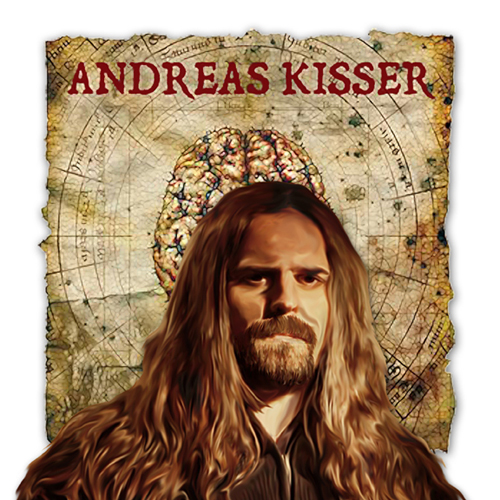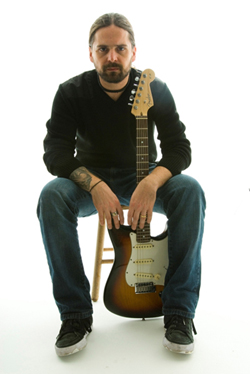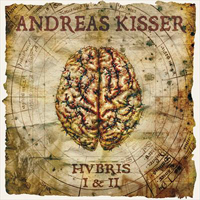|

Interview with
Andreas Kisser (November 2009)
Sepultura guitarist
Andreas Kisser has been churning out distinctive guitar leads and blistering
riffs with his fellow Brazilians for over 20 years. He's not the original
guitarist, but he's been with the band since 1987. The departure of the
Cavalera brothers left Andreas steering the ship by himself, with original
bassist Paulo Jr. still along for the ride.
Calling from his home in Sao Paulo, Brazil, Andreas
talked about his new double CD, the status of Sepultura and fatherly advice.
What's going on with Sepultura?
Andreas Kisser: We've been playing
shows in Brazil, we're still touring for our album A-Lex. We just played in
Chile with Faith No More, we have a festival coming up with Jane's Addiction
next year in Europe. It's our celebration of 25 years, and it's very good to
celebrate.
What motivated you to create the music on Hubris I
& II? Was it nice to step away from Sepultura and create something this
awesome for yourself to enjoy?
Andreas: Well, I started out playing
the acoustic guitar, then the electric, but I always kept both. I started
playing classical guitar (before joining Sepultura). I've always loved the
classical guitar style played by Randy Rhoads and Ritchie Blackmore, and
classical music and old rock 'n' roll. Some songs are 15 years old. I have a
mini-drum machine and started recording and organizing demos until I had
enough for the concept for a double album. I experimented a lot, as much as
I could. My friends from Brazil play on it, and we had a blast. It took a
long time to make it in between breaks from Sepultura. It's very different
but I am happy with the results. We did some shows in Brazil and had some
good response.
| What was
the concept behind the album, and what does hubris mean?
Andreas: Hubris is of Greek
origin, and it means arrogance, a human being who thinks he's God,
creator of the universe. It's related to men flying, an arrogance
toward nature that drives us to grow in technology; trash,
pollution, putting the planet in jeopardy, the extremes. That's what
the cover art explains, with the brain covered in barbed wire, it
symbolizes human relations. Music is spiritual, it has different
cultures and freedom of expression. I tried to create each song as
an experience of what I was feeling.
On the songs that actually have vocals,
they are mostly sung in your native Portuguese , and the music
sounds like it is rooted in the Brazilian/South American culture.
How important was this to convey while writing the songs? Was it a
conscience effort?
Andreas: I did everything
here in Brazil, all the musicians are Brazilian. Brazilian people
have a way of playing music, whether its metal or classical. Being
Brazilian, living here and the culture, being exposed to a different
style of music, it's always fresh. Being here, that experience came
out in the music.
Where did you draw your influences from on
Hubris I & II?
Andreas: Heavy metal is what
I play. Everything I play has metal intentions, always deep and
heavy, and I try to explore that all the time. But I also love the
classical guitar as well as classical music composers 600 to 700
years ago. It's great to have a different perspective of writing. If
you have classical guitar training, you can play any style of music.
It's great to explore the classical side. Also the blues, guitarists
like Stevie Ray Vaughan, as well as Steve Vai and Joe Satriani. I
don't like jazz that much, though ... |
 |
 |
Really?
Because while listening to some parts of Hubris I & II, it reminds
me of jazz fusion guitar greats like Al DiMeola, Pat Methany and
Stanley Jordan.
Andreas: Well, those guys are monsters! They do have a Brazilian
influence in their music with the same similarities. That's a great
reference!
On Hubris, you sing, play the bass,
guitar, sitar and who knows what else, but you also have many local
guest musicians, how important was it to keep it in the family, so
to speak, when inviting musicians to play on the disc?
Andreas: I know so many
people. There are many musicians not well- known here in Brazil who
survive by playing in small clubs, and they are great musicians. I
went after the musicians I knew. It was a great vibe, there wasn't
any pressure of being in a band like Sepultura. It was a relaxed
atmosphere, I could take my time. There was no pressure from the
label, they gave me all the time I needed.
How did you separate the songs on each
disc? Did you just know that disc 1 would be electric and heavier,
and disc 2 would be the acoustic songs? How did you come up with the
arrangement?
Andreas: The way the songs
came about was on a small drum machine with rhythms and loops. It
was creative, I'd just write. It depended on the day and what mood I
was in while working on the songs. I was experimenting a lot. The
concept was easy to separate and choose the songs for each disc.
Obviously you're very passionate about
where you come from. Being someone who made it out of the struggles
of your country, do you feel your music and concerts are a way of
giving back to the community?
Andreas: Music is a great
tool to reach people everywhere. Even in Sepultura, we played in
Cuba, Asia and Africa with their different cultures, political and
religious beliefs. But music opens doors everywhere. It's a powerful
tool that brings people together. You can express your point of view
of what we see around the world and relate to people everywhere.
It's great to make friends everywhere and to travel and express this
through music. |
| Are you a
family man? Any kids?
Andreas: Oh yes, I have a
daughter, 14, and two boys, 12 and 4.
I'm a father too, so I know it's sometimes
difficult. What's your fatherly advice?
Andreas: Listen to Daddy! (both
laugh) It's not easy to raise kids, but with the help of school, and
how my father and mother raised me, the past experiences. Your kids
have to come to you with their own experiences and conversation. I
do travel a lot, but I'm very close to my family. The technology
allows us to stay in touch more and be a part of their lives. You
have to be a friend of your kids. It's great, though. We actually
learn a lot more than they do! Every time they grow a year older,
you actually learn something new.
What are your views on religion?
Andreas: Religion is very
schizophrenic. It's a weird concept of creating an unnatural view of
the world. Religion and politics are the same; it's the creation of
enemies in their mind, human invention. It's confusing to deal with
doubts or spirits; there's no start, no end. It's a political
concept. You should try to learn from each other, don't force
religion on people. Religion is not freedom. In religion you have an
enemy, I can't say from where or with who, but if you follow
religion, you will have an enemy for sure. |
 |
What are Brazil's chances at the upcoming World
Cup?
Andreas: Brazil are always the
favorite. The history we have, the good teams we produce that do very well
with good players. We have a huge tradition. Brazilians are fanatics,
including me!
I really appreciate you taking the time talking
with me, Andreas. Any last words for your fans?
Andreas: I appreciate the opportunity
to talk about my new album, and I'd like people to check it out. Just keep
an open mind, and ears. I'll announce some shows. We're
getting good response from the CD, but we'll see what happens. No worries.
Reviewed by Kelley Simms
|
|
 |
Andreas Kisser - Hubris I
& II Album available on Mascot Records.
www.myspace.com/andreaskisser /
www.andreaskisser.com.br.
|
|